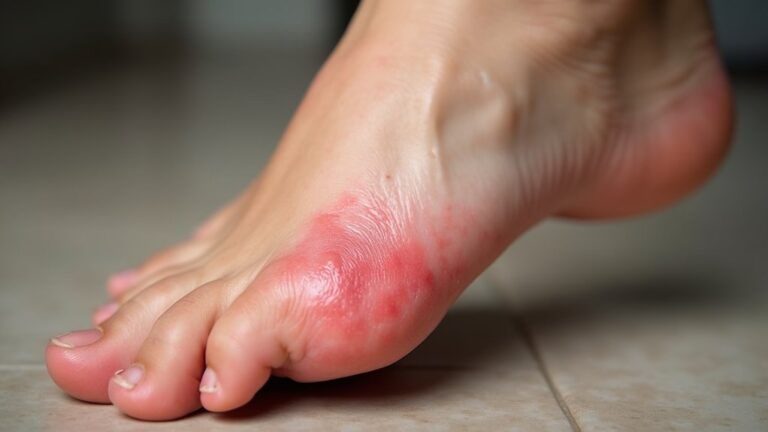Ice cream can be the ultimate comfort food, but it can also lead to some not-so-comfortable moments. Should you’ve ever enjoyed a scoop only to find yourself facing unexpected digestive drama the next day, many share your experience. It’s a sneaky treat that could stir up issues like lactose intolerance, high sugar content, or even that spicy meal you enjoyed beforehand. Curious about what may be behind this gut-wrenching mystery? Let’s investigate the culprits that could be to blame.
Lactose Intolerance and Its Connection to Diarrhea
In case you’ve ever enjoyed a scoop of ice cream only to find yourself feeling queasy later, many others share this experience. For numerous individuals, this discomfort stems from lactose intolerance, a condition where your body struggles to digest lactose found in milk and dairy products.
About 65% of folks worldwide produce less of the lactase enzyme after childhood, leading to symptoms like diarrhea, bloating, and gas from undigested lactose fermenting in your colon.
After indulging in ice cream, these symptoms can pop up anywhere from 30 minutes to 2 hours. To pinpoint lactose malabsorption, a hydrogen breath test can be performed, detecting gas levels that indicate fermentation.
Know that small amounts of lactose, like in a cup of milk, might be manageable for some, but larger quantities often lead to trouble.
The Impact of Ice Cream on Digestive Health
Eating ice cream could feel like a blissful escape on a hot day, but for many, it can lead to unexpected digestive woes.
Should you be lactose intolerant, which affects 70% of adults, consuming ice cream can trigger diarrhea. That’s because without enough lactase, your body struggles to digest lactose, leading to undigested lactose in your colon.
Additionally, the high-fat content could stimulate your digestive system too much, causing further issues.
Watch out for sugar alcohols like sorbitol in certain ice creams as they can ferment in your gut, resulting in osmotic diarrhea.
Should you have irritable bowel syndrome, dairy could exacerbate your symptoms, making that comforting scoop not so comforting after all.
Enjoy ice cream, but be mindful of your body!
Coffee: A Common Trigger for Digestive Discomfort
Coffee could appear like the ideal pick-me-up whenever you need an uplift, but for many, it can also stir up some serious digestive discomfort. Here are a few reasons why your morning brew may not sit well with your body:
- Caffeine stimulates your digestive system, leading to urgent bowel movements that can cause diarrhea within 30–60 minutes.
- Chlorogenic acid increases gastric acid production, speeding up bowel movements and potentially causing stomach pain.
- Should you be lactose intolerant, adding dairy creamer can worsen your symptoms, particularly should you struggle digesting lactose.
With over 63% of regular coffee drinkers reporting these urgent bowel symptoms, it’s vital to listen to your body and consider how that cup of joe may impact your digestive health.
The Role of Sugar Substitutes in Gastrointestinal Distress
Whenever you grab a sugar-free ice cream, you may not realize that sugar substitutes can cause some serious tummy troubles.
Sugar alcohols like sorbitol and xylitol, while popular in these treats, can lead to discomfort should you overindulge.
Plus, everyone’s tolerance is different, so it’s good to be mindful of how your body reacts to these sweeteners.
Common Sugar Alcohols Identified
Traveling through the world of sugar substitutes can feel like a maze, particularly while aiming to find the right treats that won’t leave you feeling gassy or uncomfortable. Many people enjoy sugar-free ice cream but need to be aware of the potential culprits:
- Sorbitol: Commonly found in “no sugar added” ice creams, it’s only partially absorbed, leading to fermentation in your gut and causing discomfort.
- Xylitol: This has a laxative effect, and eating over 50g daily can definitely cause diarrhea.
- Maltitol: Often in low-carb ice creams, consuming more than 20g can wreak havoc on your digestive system.
If you’re lactose intolerant, keeping an eye on sugar alcohols is essential to avoid the symptoms of lactose intolerance.
Symptoms of Digestive Distress
You could fail to recognize it, but indulging in that creamy scoop of ice cream can occasionally trigger a whirlwind of digestive issues, particularly when sugar substitutes are involved.
Assuming you’re lactose intolerant, the delayed symptoms like gas and bloating could surprise you—a result of undigested lactose fermenting in your colon.
Sugar alcohols like sorbitol can cause immediate digestive distress, leading to diarrhea, while artificial sweeteners disrupt gut bacteria balance, resulting in loose stools for sensitive individuals.
Plus, high fructose levels can overwhelm your absorption capacity, triggering maldigestion.
Should you experience a stomach upset after eating, many share this experience—numerous individuals face these issues after exceeding sugar substitute tolerances.
Identifying these symptoms can help guide your ice cream choices wisely.
Dosage and Individual Tolerance
Acknowledging how sugar substitutes play into digestive comfort can be a major shift, especially after indulging in that scoop of ice cream. Your individual tolerance matters; even small amounts can cause issues.
Here are some key points to weigh:
- Sugar Alcohols: Found in sugar-free ice cream, they can pull water into your intestines, causing diarrhea at only 10–20g.
- Incomplete Absorption: Provided you’re sensitive, consuming as little as 5g of xylitol could lead to trouble digesting in the small intestine.
- Gas and Osmotic Effects: Ingredients like erythritol can ferment in the colon, producing gas and potentially causing diarrhea 6–12 hours later.
In case you’re FODMAP-sensitive, watch out for fructose in syrups, too.
Grasping these factors can make dessert choices easier!
Fast Food and Its Effects on Digestion
At times you’re craving a quick bite from your favorite fast-food joint, it’s easy to overlook how your body could react. Fast food often packs a high-fat content, which can stimulate colonic contractions, leading to diarrhea within hours. Processed oils might trigger osmotic diarrhea, drawing excess water into your intestines. A typical meal can exceed 30 grams of fat, surpassing the 10-15 gram limit that causes digestive distress.
| Culprit | Possible Effect | Onset Time |
|---|---|---|
| High Fat Content | Colonic contractions | A few hours |
| Processed Oils | Osmotic diarrhea | Same day |
| High Sodium Levels | Altered fluid balance | Within 24 hours |
Keep in mind, your gut microbiota can be disrupted through fast food additives, potentially worsening diarrhea symptoms.
Spicy Foods: A Potential Irritant for Sensitive Stomachs
In case you’ve ever regretted a spicy meal shortly after eating, you’re not alone.
Capsaicin, the compound that gives chili peppers their heat, can speed up digestion and irritate your gut, particularly in case you’re sensitive.
Capsaicin and Digestion
Although many people enjoy the fiery kick of spicy foods, those with sensitive stomachs often find themselves regretting a late-night taco binge. Capsaicin, the active component in chili peppers, can throw your digestive system into chaos. Here’s how it might affect you:
- Capsaicin binds to TRPV1 receptors, triggering pain signals and accelerating intestinal contractions, which might lead to diarrhea.
- It increases intestinal permeability, causing water to leak into your bowel, resulting in loose stools.
- Studies show that capsaicin speeds up colonic transit time through 30%, contributing to those pesky abdominal cramping and increased gut motility.
Food Sensitivity Response
In the event you partake in spicy foods, you potentially don’t realize that you’re putting your stomach on a rollercoaster ride, particularly should you’re prone to digestive issues. Spicy foods can irritate your stomach lining, often leading to an upset stomach or diarrhea, especially the next day.
For those with a food sensitivity response, combining spicy foods with dairy products or alcohol can worsen intolerance symptoms, as many people struggle to digest the lactose properly. Should you not have enough lactase, eating less dairy alongside those hot peppers could save you from trouble.
Keep in mind, foods can cause varying reactions in each of us, so pay attention to how your body responds to avoid future discomfort.
Alcohol Consumption and Its Relationship to Diarrhea
At the time you enjoy a drink, you could fail to recognize that it might result in an upset stomach later. Alcohol can irritate your stomach lining, speed up digestion, and even lead to diarrhea shortly after.
Here are a few reasons it may occur:
- Gut Bacteria Balance: Excessive alcohol consumption can disrupt your gut’s bacteria, causing loose stools.
- Binge Drinking: This can increase intestinal permeability, raising your likelihood of diarrhea and dehydration.
- Sensitive Digestive Systems: Even moderate drinking can trigger digestive issues, particularly in case you have IBS or react to fermentable sugars in beer or wine.
Be mindful; your digestive system could respond differently. Enjoy responsibly, and pay attention to how your body feels afterward.





